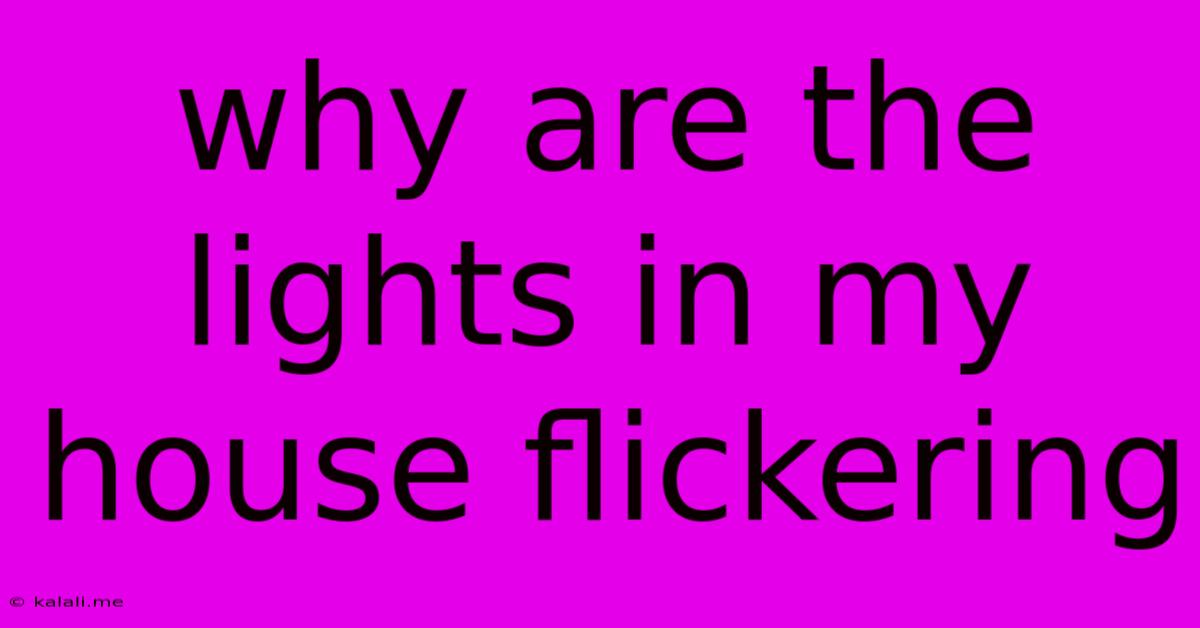Why Are The Lights In My House Flickering
Kalali
Jun 06, 2025 · 3 min read

Table of Contents
Why Are the Lights in My House Flickering? A Comprehensive Guide
Are your lights flickering? This annoying problem can be caused by a variety of factors, ranging from simple fixes to more serious electrical issues. Understanding the potential causes can save you time, money, and potentially prevent a fire hazard. This guide will walk you through the most common reasons why your house lights are flickering and how to troubleshoot them.
Common Causes of Flickering Lights:
Flickering lights are more than just an annoyance; they can indicate underlying electrical problems. Here's a breakdown of the most frequent culprits:
1. Loose Bulb or Fixture: The Simple Fix
Before diving into complex electrical work, check the most obvious: the light bulb and its fixture. A loose bulb is a common cause of flickering. Simply try screwing the bulb in more tightly. If the flickering persists, the problem might lie with the fixture itself. Examine the connections within the fixture; a loose wire or corroded connection can lead to intermittent power.
2. Overloaded Circuit: Too Much Power Draw
This is a common cause, especially if you've recently added new appliances or lights to a circuit. When too many devices draw power from a single circuit, it can overload the system, causing flickering lights. Unplug some devices on that circuit to see if the flickering stops. If it does, you'll need to either redistribute your appliances across different circuits or consider upgrading your electrical panel. This is best left to a qualified electrician.
3. Faulty Light Switch: A Simple Replacement
A worn-out or faulty light switch can also cause flickering. The internal components of the switch might be deteriorating, leading to inconsistent power flow. Replacing a light switch is a relatively straightforward DIY task, but if you're uncomfortable working with electricity, call an electrician. Before replacing, always turn off the power at the breaker box.
4. Problems with Wiring: A Potential Hazard
This is a more serious issue. Loose, damaged, or corroded wiring within the walls can cause flickering lights. This poses a fire risk and should be addressed by a professional electrician immediately. Do not attempt to repair this yourself unless you are a qualified electrician. Look for signs of burnt wiring or unusual smells near electrical outlets or fixtures.
5. Power Surge or Voltage Fluctuation: External Factors
Sometimes, the problem isn't within your house at all. Power surges from storms or other external factors can cause lights to flicker. While you can't prevent these entirely, surge protectors can help minimize the damage to your electronics and potentially prevent light fixture damage. Voltage fluctuations from the power grid can also be responsible. Contact your electricity provider if you suspect this is the case.
6. Failing Light Fixture: Time for an Upgrade?
Older light fixtures, particularly those with outdated wiring or components, can become faulty over time, leading to flickering lights. Replacing the fixture entirely might be the most effective solution in these cases. Ensure you choose a fixture rated for the appropriate wattage of your bulb.
7. Dimmers: More Than Meets the Eye
While dimmers offer convenient light control, faulty dimmers can contribute to flickering. If you're using dimmers and experiencing this issue, try turning them to their maximum brightness. If this resolves the issue, replace the dimmer switch.
When to Call an Electrician:
While some issues can be fixed easily, it's crucial to know when to seek professional help:
- Persistent flickering despite troubleshooting: If simple fixes don't work, a professional electrician can diagnose more complex problems.
- Flickering accompanied by buzzing or burning smells: This strongly suggests a serious electrical issue.
- Tripped breakers frequently: This could indicate a problem with your electrical system's capacity.
- Visible damage to wiring: Never attempt to handle exposed or damaged wiring yourself.
Don't ignore flickering lights. Addressing the cause promptly can prevent more significant problems and ensure the safety of your home and family. By understanding the potential sources, you can effectively troubleshoot the problem or know when to call in a professional for assistance.
Latest Posts
Latest Posts
-
How Many Led Lights On A 15 Amp Circuit
Jun 07, 2025
-
How To Use Vats In Fallout 4
Jun 07, 2025
-
Can Flash Travel To Universes With Speed
Jun 07, 2025
-
Who Was The Centurion In Luke 7
Jun 07, 2025
-
Can You Inflate A Car Tire With A Bike Pump
Jun 07, 2025
Related Post
Thank you for visiting our website which covers about Why Are The Lights In My House Flickering . We hope the information provided has been useful to you. Feel free to contact us if you have any questions or need further assistance. See you next time and don't miss to bookmark.